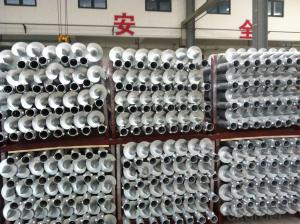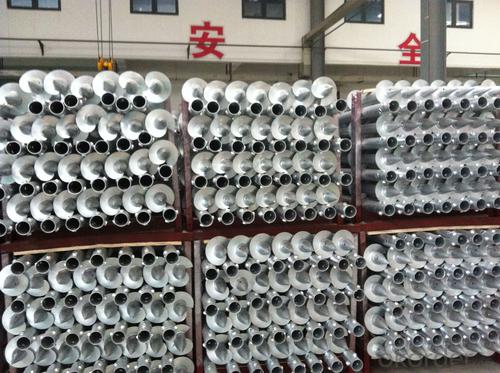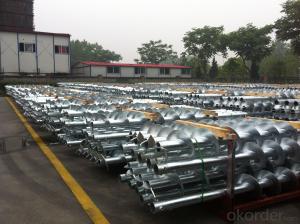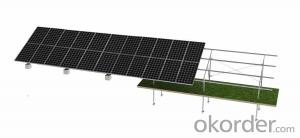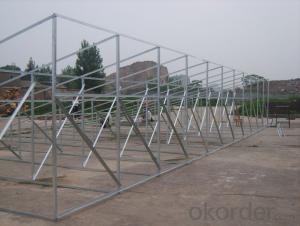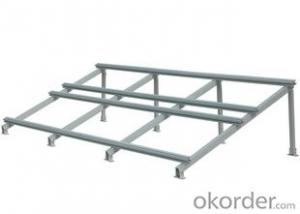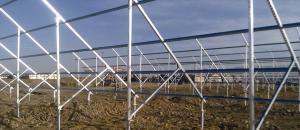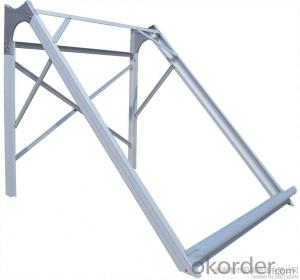Solar Energy Systems Nppd Solar Screw Pile System
- Loading Port:
- China Main Port
- Payment Terms:
- TT OR LC
- Min Order Qty:
- -
- Supply Capability:
- -
OKorder Service Pledge
OKorder Financial Service
You Might Also Like
Packaging & Delivery
Packaging Detail:Normal package seaworthy
Delivery Detail:15 days
Specifications
Easy installation Competitive price TUV&SGS test report & CSA certification 15-warranty
Specifications
1) Super smooth beautiful appearance,outstanding quality,large supply.
2) Available in customized surface finishes.
3) Well machined,for example,cutting,drilling and milling with excellent tolerance.
4) Meet with customer’s designs and supply you best price.
5)Usages:Supply for solar panel modules.
Technical characteristics
Installation site:
ground,hillside,and grassland
Installation angle
it is based on customers’ requirements
Installation height
it is basedon customers’ requirements
Solar panel type; with or without frame
Components arrangement :horizontal or vertical
Support track
aluminum alloy extrusion
Quality warranty
15 years
Advantages
1)Quick installation: with high degree of pre-installed rate, the system could be easily installed by using galvanized carbon steel rails for PV Stent, and specially designed connection parts of the PV bracket, which could reduce installation time and cost greatly.
2)Offer unmatched durability: with all structural components comprised of high class stainless steel and anodized aluminum alloy, it is designed for 25 years service life and backed by 15 years warranty.
3)Stand up to extreme weather: The SuninTek solar mount is designed to stand up to the extreme weather complied with the AS/NZ 1170 and other international structure load standard by the skilled engineer. The main support components also have been tested to guarantee its structure and load-carrying capacity.
4)Provide broad installation flexibility: These systems accommodate most commercially available framed solar panels , and they can scale easily from small to large, multi-megawatt installations.
5)Diversified Application: The PV mounting system produced can be adopted by various types of PV cells panels which you can find in the market. It can serve for both mini solar power system and huge plant with megawatt capability.
Main features
1. Installation cost savings.
2. Save installation time.
3. Increase the mechanical strength of solar energy mounting to ensure that wind requirements.
4. The outdoor for installation of solar energy.
5. Length can be customized according to customers.
6. Service life of up to 25 years.
7. Products through the international certification.
8. Stent material composition of the galvanized steel and aluminum.
9. 15 years system and structural guarantee.
10.Flexible post spacing withstands different wind & snow loads.
11. High quality material in Aluminium 6005-T5 and SUS 304.
12.Screws and nuts go with every components needed.
13.Mechanical calculation and reliability tested to ensure highest product quality.
- Q: What is solar energy?
- Solar energy is the renewable form of energy derived from the sun's radiation, which is harnessed using various technologies such as solar panels or photovoltaic cells to convert sunlight into electricity or heat.
- Q: How do solar energy systems impact air quality?
- Solar energy systems have a positive impact on air quality as they produce clean, renewable energy without emitting harmful pollutants or greenhouse gases. By replacing fossil fuel-based energy sources, solar energy helps reduce air pollution, improve local air quality, and mitigate the negative effects of climate change.
- Q: Can a solar energy system be used to power outdoor lighting?
- Yes, a solar energy system can be used to power outdoor lighting. Solar panels collect and convert sunlight into electricity, which can be stored in batteries and used to power outdoor lights during the night. This offers an environmentally-friendly and cost-effective solution for outdoor lighting.
- Q: Can solar energy systems be used in areas with limited access to solar charge controllers?
- Yes, solar energy systems can still be used in areas with limited access to solar charge controllers. While solar charge controllers are important for regulating the flow of electricity from the solar panels to the batteries, there are alternative methods available. For example, manual charge controllers or simple voltage regulators can be used to protect the batteries from overcharging. Additionally, it is possible to design solar energy systems with smaller battery banks or use direct power consumption without the need for batteries, which eliminates the requirement for charge controllers altogether. Therefore, even in areas with limited access to solar charge controllers, solar energy systems can still be effectively utilized.
- Q: Are there any insurance requirements for installing a solar energy system?
- Yes, there are typically insurance requirements for installing a solar energy system. Homeowners or businesses installing a solar energy system are often required to have adequate insurance coverage to protect against potential damages or liabilities associated with the installation and operation of the system. This may include general liability insurance, property insurance, and potentially additional coverage specific to solar energy installations. It is important to consult with your insurance provider and review local regulations to determine the specific insurance requirements for installing a solar energy system in your area.
- Q: Are there any risks of electrical arcing with solar energy systems?
- Yes, there are risks of electrical arcing with solar energy systems. Electrical arcing can occur due to various factors such as faulty wiring, loose connections, or damaged components. This can lead to fires, damage to the system, and potential harm to individuals nearby. Therefore, proper installation, regular maintenance, and adherence to safety guidelines are crucial to minimize the risks of electrical arcing in solar energy systems.
- Q: How does the quality of solar panels affect their performance?
- The quality of solar panels directly affects their performance. Higher quality panels tend to have better conversion efficiency, meaning they can convert a higher percentage of sunlight into electricity. They also tend to be more durable and have a longer lifespan, which means they can continue to generate electricity efficiently over a longer period of time. In contrast, lower quality panels may have lower efficiency, degrade faster, and be more prone to failure, resulting in reduced performance and shorter lifespans. Therefore, investing in higher quality solar panels is crucial for maximizing their performance and long-term benefits.
- Q: Do solar energy systems work at night?
- No, solar energy systems do not work at night as they rely on sunlight to generate electricity.
- Q: How does the size of a solar energy system affect its cost?
- The size of a solar energy system directly affects its cost. Generally, the larger the system, the higher the cost. The cost of a solar energy system is determined by multiple factors, including the number of solar panels, the type and quality of the panels, the inverter capacity, the mounting equipment, and the installation labor. One key component in determining the cost is the number of solar panels. Solar panels are the primary source of energy generation in a solar system. The more panels installed, the greater the energy output of the system. However, each additional panel adds to the overall cost, including the cost of the panel itself, as well as additional wiring, mounting hardware, and installation labor. Another factor to consider is the type and quality of the solar panels. Different panels have varying efficiencies, durability, and warranties. Higher-quality panels with better efficiency tend to be more expensive. However, they often come with longer warranties and may generate more electricity over their lifetime, resulting in higher overall savings. Inverter capacity is also an important factor affecting the cost. Inverters convert the direct current (DC) produced by the solar panels into alternating current (AC) that can be used to power household appliances. Larger solar systems usually require larger inverters to handle the increased energy production. Higher capacity inverters come at a higher cost, contributing to the overall system cost. Mounting equipment and installation labor costs are additional considerations. Larger systems may require more mounting equipment, such as racks and brackets, to securely hold the solar panels. Additionally, the installation labor cost increases with the size of the system, as more time and effort are required to install a larger number of panels. It is important to note that while the upfront cost of a larger solar energy system may be higher, it can also provide greater long-term savings through reduced electricity bills. A larger system will generate more electricity, potentially offsetting a greater portion of your energy needs and reducing your reliance on grid electricity. Overall, the size of a solar energy system has a direct impact on its cost. The number of panels, type and quality of panels, inverter capacity, mounting equipment, and installation labor all contribute to the total cost of the system. It is essential to carefully consider your energy needs and budget when determining the appropriate size of a solar energy system for your specific requirements.
- Q: Can solar energy be used to power my entire home?
- Yes, solar energy can be used to power your entire home. By installing solar panels on your roof or in your yard, you can generate electricity from the sun's rays. This electricity can then be used to power all the electrical appliances and systems in your home, including lights, heating/cooling, and electronic devices. However, the feasibility and capacity of powering your entire home with solar energy may depend on factors such as the size of your solar panel system, your energy consumption, and local climate conditions.
Send your message to us
Solar Energy Systems Nppd Solar Screw Pile System
- Loading Port:
- China Main Port
- Payment Terms:
- TT OR LC
- Min Order Qty:
- -
- Supply Capability:
- -
OKorder Service Pledge
OKorder Financial Service
Similar products
Hot products
Hot Searches
Related keywords
